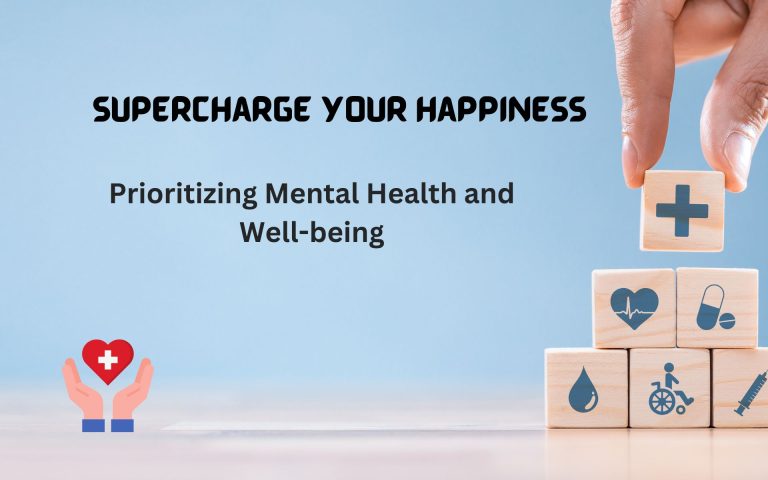Introduction
In today’s fast-paced and demanding world, it is crucial to prioritize our mental health and well-being. Neglecting these aspects can have detrimental effects on our overall happiness and quality of life. But what exactly is happiness? It goes beyond momentary pleasure or fleeting excitement. True happiness is a state of overall well-being, contentment, and fulfillment. It is a journey that requires us to invest time and effort into nurturing our mental health. In this article, we will explore the link between mental health and happiness, discuss various self-care practices, strategies for building resilience, the importance of work-life balance, the power of gratitude and positive thinking, nurturing relationships, finding joy in everyday life, overcoming obstacles to happiness, the role of nutrition and exercise, cultivating a healthy mindset, managing stress and anxiety, developing a personal happiness plan, fostering a supportive mental health culture, understanding happiness in different cultures, and ultimately, provide you with the tools to embark on a path towards a happier and more fulfilling life.
The Link Between Mental Health and Happiness
Sound mental health is vital for our overall well-being and happiness. When our mental health suffers, it often affects our ability to experience happiness genuinely. Mental health challenges can range from anxiety and depression to stress and burnout. These issues can sap our joy, hinder our personal growth, and strain our relationships. On the other hand, prioritizing our mental health can result in profound improvements in our happiness. It enhances our emotional resilience, boosts our self-esteem, and provides us with the clarity and stability needed to navigate life’s challenges. With a healthy mind, we become more capable of experiencing genuine happiness and leading a fulfilling life.
Self-Care for Mental Health
Self-care is not a luxury; it is an essential aspect of maintaining good mental health. It involves actively taking care of one’s physical, emotional, and psychological well-being. Practicing mindfulness and relaxation techniques can help to manage stress, reduce anxiety, and improve overall mental health. Taking time for oneself to engage in activities that bring joy and relaxation, such as reading a book or taking a long bath, can have a significant positive impact on our happiness. Furthermore, fostering healthy relationships and social connections plays a crucial role in our mental well-being. Surrounding ourselves with supportive loved ones, participating in meaningful social activities, and prioritizing deep and authentic connections can contribute to our overall happiness. Embracing physical activity, be it a brisk walk or engaging in a hobby, helps release endorphins, known as the “feel-good” hormones, which can enhance our mental well-being and happiness.
Building Resilience
Building resilience is paramount in promoting happiness and well-being. Strength refers to our ability to bounce back from setbacks, adapt to change, and grow through challenges. By developing emotional resilience, we cultivate the capacity to manage stress, overcome adversity, and maintain a positive outlook on life. Adopting strategies such as reframing negative thoughts, practicing self-compassion, and embracing a growth mindset can contribute to our overall emotional well-being. A growth mindset involves recognizing that our abilities and intelligence can be developed through effort and practice, rather than being fixed traits. By fostering a growth mindset, we empower ourselves to face challenges with optimism and perseverance, ultimately leading to greater happiness and personal growth.
Prioritizing Work-Life Balance for Happiness
Work-life balance plays a pivotal role in our mental health and happiness. Achieving a healthy balance between our professional and personal lives is vital to avoid burnout, reduce stress, and maintain overall well-being. Setting boundaries is crucial to prevent work from encroaching on our time and vice versa. Techniques such as time-blocking, delegating tasks, and practicing effective time management can help ensure that we devote adequate attention to both areas of our lives. It is also essential to find satisfaction and joy in our work by aligning our careers with our passions and values. By prioritizing work-life balance, we create space for leisure, self-care, and quality time with loved ones, ultimately leading to increased happiness and fulfillment.
The Power of Gratitude and Positive Thinking
Gratitude and positive thinking are powerful tools for enhancing our happiness and overall well-being. Gratitude involves acknowledging and appreciating the positive aspects of our lives, both big and small. By cultivating gratitude, we shift our focus away from negativity and cultivate a positive mindset. Techniques such as keeping a gratitude journal, expressing gratitude to others, and reflecting on moments of joy and abundance can help rewire our brains to naturally perceive the world with greater positivity. Additionally, reframing negative thoughts by consciously challenging and replacing them with positive ones can have a profound impact on our overall happiness and well-being.
Nurturing Meaningful Relationships
Meaningful relationships and social connections are essential for our mental well-being and happiness. Humans are social beings, and fostering healthy relationships is crucial in maintaining our emotional health. Building and maintaining deep connections with others involves open and honest communication, active listening, and emotional intimacy. It is important to surround ourselves with individuals who support our well-being and inspire us to grow. By investing time and energy into nurturing our relationships, we create a support system that contributes significantly to our happiness and overall sense of belonging.
Finding Joy in Everyday Life
Finding joy in daily activities is key to experiencing overall happiness. Often, we become caught up in the pursuit of long-term goals and future achievements, neglecting the present moment. By actively engaging in mindfulness and being fully present in our daily routines, we can appreciate the beauty and joy in even the simplest tasks. Cultivating hobbies, pursuing passions, and incorporating activities that bring us joy and purpose into our lives can elevate our happiness and overall well-being.
Overcoming Obstacles to Happiness
Life is filled with obstacles that can hinder our happiness. Self-doubt and negative self-talk are common barriers that stand in the way of our well-being. Overcoming these obstacles requires challenging negative beliefs, developing self-compassion, and practicing self-care. Sometimes, seeking professional help becomes necessary, and it is essential to remember that mental health professionals are there to provide guidance and support on our journey to happiness.
The Role of Nutrition and Exercise in Mental Health
The link between diet, exercise, and mental well-being cannot be underestimated. A balanced diet that includes whole foods, rich in nutrients, not only supports our physical health but also impacts our mental well-being. Adopting mindful eating practices, such as savoring each bite and paying attention to our body’s hunger and fullness cues, can contribute to our overall happiness. Similarly, incorporating regular exercise into our daily routines releases endorphins, reduces stress, and improves our mental well-being, leading to increased happiness and overall wellness.

Cultivating a Healthy Mindset
Cultivating a healthy mindset is crucial for promoting happiness and overall well-being. Self-compassion, or treating ourselves with kindness and understanding, allows us to embrace our imperfections and navigate life with greater ease and acceptance. Fostering a growth mindset involves believing that our abilities and intelligence can be developed through effort and learning from failure. By adopting a proactive approach to mental well-being, we empower ourselves to take control of our happiness and lead a more fulfilling life.
Strategies for Managing Stress and Anxiety
Stress and anxiety can significantly impact our happiness and overall well-being. It is crucial to recognize the negative effects of these emotions on our mental health. Developing effective stress management techniques, such as deep breathing exercises, mindfulness meditation, and engaging in activities that promote relaxation, can help alleviate stress and anxiety. Additionally, cognitive-behavioral approaches can assist in reframing negative thought patterns and promoting a more positive mindset. By implementing these strategies, we can cultivate a healthier mind and experience increased happiness and tranquility.
Developing a Personal Happiness Plan
Assessing our happiness levels and identifying areas for improvement is an essential step in prioritizing our mental health and well-being. Setting meaningful goals and actionable steps toward happiness allows us to take charge of our journey toward a more fulfilling life. By tracking progress and making necessary adjustments, we ensure that we are continually working towards a happier and more content existence.
The Happiness-Productivity Connection
There is a fascinating relationship between happiness and productivity. Studies have shown that when we are happy, we tend to be more motivated, creative, and productive. Recognizing this connection, and actively striving to boost our happiness, can have a significant positive impact on our professional success. Strategies such as practicing self-care, maintaining a healthy work-life balance, and fostering positive relationships in the workplace can create a harmonious environment that nurtures both happiness and productivity.
Fostering a Supportive Mental Health Culture
Promoting mental health awareness and destigmatization is essential in fostering a supportive environment for well-being. Creating safe spaces in workplaces and communities where individuals feel comfortable discussing their mental health challenges and seeking help is crucial. Educating others about mental health, cultivating empathy and understanding, and providing access to resources and support can contribute to a happier and healthier society.
The Role of Technology in Mental Health and Happiness
With the advancements in technology, we have access to numerous resources that can support our mental well-being and happiness. Mental health apps and online resources provide tools for meditation, stress management, and tracking our progress toward personal growth. However, it is important to set healthy boundaries with technology and ensure that it enhances rather than hinders our happiness. By utilizing technology mindfully, we can leverage its power to improve our mental well-being.
Understanding Happiness in Different Cultures
Happiness is perceived and experienced in diverse ways across different cultures. Exploring cultural differences in happiness allows us to expand our understanding of what brings joy and fulfillment to individuals from various backgrounds. Discovering happiness practices from different cultures can inspire us to incorporate new perspectives and approaches into our own lives, enhancing our personal happiness and overall well-being.
Summary
In this article, we explored the importance of mental health and well-being in achieving true happiness. We discussed the link between mental health and happiness, various self-care practices, strategies for building resilience, the significance of work-life balance, the power of gratitude and positive thinking, nurturing relationships, finding joy in everyday life, overcoming obstacles to happiness, the role of nutrition and exercise, cultivating a healthy mindset, managing stress and anxiety, developing a personal happiness plan, fostering a supportive mental health culture, understanding happiness in different cultures, and ultimately, provided you with the tools to embark on a path towards a happier and more fulfilling life.
FAQs
What are the signs of poor mental health?
Signs of poor mental health can include persistent feelings of sadness or hopelessness, social withdrawal, changes in appetite or sleep patterns, difficulty concentrating, unexplained physical ailments, increased irritability, and thoughts of self-harm or suicide.
How often should I practice self-care activities?
The frequency of practicing self-care activities depends on your individual needs and preferences. It's beneficial to incorporate self-care into your routine regularly. This can range from daily practices like meditation or journaling to weekly activities such as engaging in hobbies or spending time with loved ones.
Can happiness really be increased through deliberate efforts?
Yes, happiness can be increased through deliberate efforts. Engaging in activities like practicing gratitude, cultivating positive relationships, exercising, pursuing meaningful goals, and practicing mindfulness can have a positive impact on happiness levels.
Is professional help necessary for everyone struggling with mental health?
Professional help is not necessary for everyone, but it can be highly beneficial for many individuals. Mental health professionals are trained to provide appropriate support, guidance, and treatments tailored to specific needs.
How can I support a loved one's mental well-being?
Supporting a loved one's mental well-being involves being empathetic, listening without judgment, encouraging professional help if needed, promoting self-care, and offering practical assistance. Showing care, understanding, and validation can make a significant difference.

